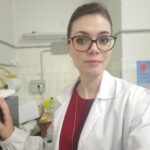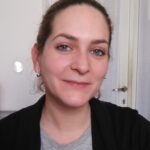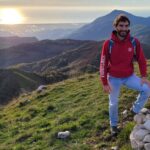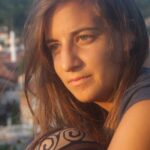NEUROPHYSIOLOGY LAB

Eleonora Pali
Eleonora Pali got a PhD student in Biomedical Sciences at the Department of Brain and Behavioral Sciences (University of Pavia). She holds a bachelor’s degree in Biological Sciences cum laude (University of Florence) and a master’s degree in Neurobiology cum laude (University of Pavia).
Combining in vitro electrophysiological approaches with optogenetics, her main project is focused on investigating the spatiotemporal processing of inputs in the cerebellar cortex. She is also deciphering a key mechanism of dendritic processing that implements spike-timing dependent plasticity in cerebellar Golgi cells using the whole-cell patch clamp technique.
 Giorgia Pellavio
Giorgia Pellavio
Giorgia Pellavio holds a Master’s degree in Experimental and Applied Biology and obtained a PhD in Translational Medicine at the Departement of Molecular Medicine (University of Pavia) in 2021. She worked as a postdoctoral research fellow at the Human Physiology Unit (Departement of Molecular Medicine, University of Pavia) focusing on membrane permeability studies in physiological and in different oxidative stress conditions.
She joined the Egidio d’Angelo’s Lab in 2024 as a postdoctoral research fellow to study microcircuit alterations in a mouse model of cerebellar paroxysmal disorders (PRRT2 paroxysmal disorder), via recordings in acute mouse cerebellar slices using Two-Photon Laser Microscopy and 3D HD Microelectrode Array (MEA).
NEUROCOMPUTATIONAL LAB
 Martina Rizza
Martina Rizza
Martina Rizza holds a Phd in Computer Science (University of Milano-Bicocca), a Master’s degree in Neurobiology (University of Pavia) and a Bachelor’s degree in Biotechnology (University of Milano-Bicocca).
She is currently a post-doc research fellow in the Neurocomputational Laboratory, Department of Brain and Behavioral Sciences, University of Pavia.
Research Experience:
Computational neuroscience: realistic computational model of cerebellar neurons, parameter estimation of neuron models, reconstruction of the cerebellar microcircuit.
Computational modeling and simulation with NEURON-Python, knowledge of NEURON simulation tool, Python programming language and MATLAB simulation environment.
 Alberto Arturo Vergani
Alberto Arturo Vergani
Alberto Arturo Vergani holds an MSc in Cognitive Science from the University of Milan (2011-2014) and a Ph.D. in Computer Science and Computational Mathematics from the University of Insubria (2015-2018).
His postdoctoral experience began in 2019 at Middlesex University in London (Chris Huyck’s lab), where he worked on neuromorphic simulations, supported by a fellowship from The Human Brain Project. In 2020, he joined the University of Aix-Marseille, Institut de Neurosciences de la Timone (Frederick Chavane’s lab), where he focused on modeling and simulation of the mammalian V1 cortex, funded by the French ANR Horizontal-V1 grant. In 2021, he joined the Sant’Anna School of Advanced Studies, Institute of BioRobotics (Alberto Mazzoni’s lab), where he adopted a combined approach of data analysis and modeling of neurophysiological biomarkers in different pathologies (Alzheimer’s and Parkinson’s disease, genetic epilepsy, autism spectrum disorder), funded by PREVIEW and TMSpath grants.
From October 2024 he joined the University of Pavia, Department of Brain and Behavioural Sciences (Egidio D’Angelo’s lab), Neurocomputation Unit (headed by Prof. Claudia Casellato). His current projects focus on computational studies of cerebellar pathologies (Ataxia, Neatmove) and psychiatric disorders (Schizophrenia, The Virtual Brain Twin).
 Dimitri Rodarie
Dimitri Rodarie
Dimitri RODARIE holds a PhD in Neurosciences (EPFL University), a Master’s degree in Artificial Intelligence (University of Lyon 1) as well as a Engineering degree in Computer Sciences (University of Lyon 1).
He is currently a Post-doc research fellow in the Neurocomputational Laboratory, Department of Brain and Behavioral Sciences, University of Pavia.
Dimitri’s work has been centered around the data-driven reconstruction and simulation of point-neuron models of the mouse brain. In particular, his expertise lies in atlas-based modeling of brain circuits including cell orientations, density estimation, placement and morphology fitting to the brain shape. Since he joined Egidio d’Angelo’s Lab in 2022, Dimitri has been leveraging his experience to create informatics tools and workflows for modeling and simulating the cerebellar cortex.
NEUROIMAGING LAB

Roberta Lorenzi
Roberta Lorenzi holds a M.Sc. in Bioengineering at University of Pavia. During her studies, Roberta developed a special interest in healthcare-oriented machine learning and programming. In her thesis work, she investigated the involvement of spinal cord in dementia disease, applying machine learning algorithms to Magnetic Resonance Imaging.
Roberta is now focused on the programming of brain activity simulations through The Virtual Brain (TVB) simulator. In addition, she is implementing a computational model of the cerebellum, aiming to reproduce cerebellar activity, compatible with TVB and other brain simulators technology”.

Marta Gaviraghi
Marta Gaviraghi is a Ph.D. student at University of Pavia – Dept. of Electrical, Computer and Biomedical Engineering. She holds a M.Sc. in Bioengineering at University of Pavia. In her thesis work, she developed an automatic method (based on deep learning) for segmentation of dentate nuclei in Magnetic Resonance Image.
Marta is now focused on the reconstruction of quantitative diffusion maps from k-space of Diffusion Weighted Images.
DIGITAL NEUROSCIENCE CENTER, IRCCS Mondino Foundation

Anita Monteverdi
Anita Monteverdi holds a Master degree in Medicinal Chemistry (University of Pavia) and the PhD degree in Physiology (University of Pavia). Techniques: High Density Multielectrode array recordings on cerebellar slices; functional Magnetic Resonance Imaging(fMRI); MR spectroscopy (MRs). Research field: Electrophysiological and imaging investigation of cerebellar network function
